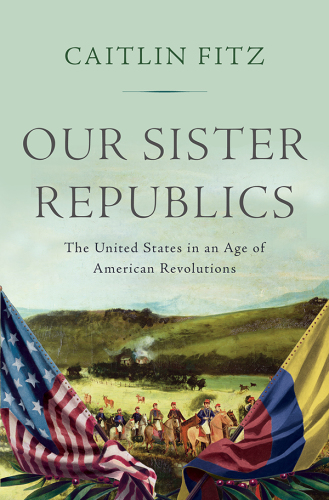
Our Sister Republics
The United States in an Age of American Revolutions
کتاب های مرتبط
- اطلاعات
- نقد و بررسی
- دیدگاه کاربران
نقد و بررسی

May 2, 2016
In this accessible, scholarly account, historian Fitz reframes early U.S. history in light of American perceptions of Latin American revolutions during the early 19th century. As an insurgent Latin America toppled European tyranny and embraced republican forms of government, onlookers in the U.S. reacted to these breakthroughs with enthusiasm and support—including naming towns and children after the liberator Simón Bolívar, providing arms, and volunteering as armed adventurers—as well as plenty of self-aggrandizement, often viewing their own anticolonial conflict and subsequent embrace of republicanism as the primary impetus for the entire hemisphere’s revolutionary developments. However, as Latin American insurrections went beyond republicanism and toward abolitionism, the continuing proliferation of slavery and tightening racial hierarchy within the U.S. exposed the limits of the American Revolution and soured Americans’ enthusiasm for their southern neighbors. Fitz argues that a previously unrecognized turning point occurred in which a “racialized strain of nationalism” based on U.S. white exceptionalism began to develop, in which the U.S. perceived itself as the “white, moderate, and prosperous exception to a hemisphere bursting with incompetent, aggressive, antislavery radicals.” This study, based on strong academic foundations and written with captivating and elegant prose, is an impressive achievement that suggests intriguing origins of American exceptionalism. Illus. Agent: Wendy Strothman, Strothman Agency.

April 15, 2016
In the early 1800s, South and Central Americans rose against Spain, forming a pastiche of multiracial revolutionary societies. But surprisingly few historians have explored U.S. reaction to these upheavals. Fitz (history, Northwestern Univ.) bridges this awareness gap by tracing a pivotal shift in American attitudes. Before 1825, Americans cheered on the revolutionaries, congratulating themselves for inspiring the "spiritual heirs of 1776" yet giving little material support to their South American "sister republics." On the other hand, sympathizers christened their sons, prize animals, and even towns after South American liberator Simon Bolivar. After 1825, praise-filled, universalist rhetoric gave way to hardening public skepticism toward the libertadores. Early "color-blind consensus" dissolved in favor of racist contempt, territorial expansionism, sectional quarrels, and slavery's spread, which flouted racially fluid Spanish America's gradual elimination of that "peculiar institution." In contrast, U.S. supporters reconceptualized slavery as "positive good" instead of "necessary evil." To build a holistic understanding of public perceptions, Fitz researches Fourth of July toasts, ditties, letters, editorials, and naming conventions across America. VERDICT Readable and groundbreaking, this work will be cited by scholars and enjoyed by general readers for years to come.--Michael Rodriguez, Hodges Univ. Lib., Naples, FL
Copyright 2016 Library Journal, LLC Used with permission.

























دیدگاه کاربران